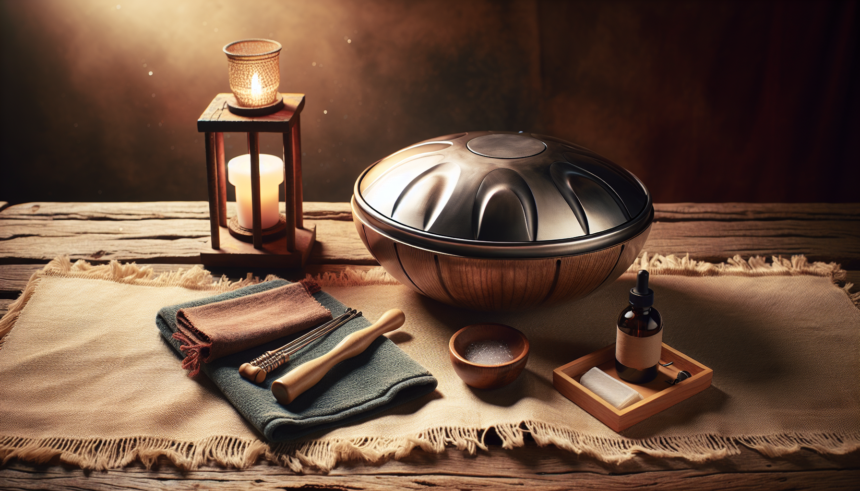Owning a handpan can be a deeply enriching experience as it offers an avenue to create resonant, ethereal music. However, keeping your handpan in top-notch condition requires a bit of dedication and know-how. Here’s a comprehensive guide to maintaining your handpan so that it continues to look and sound amazing.
1. Regular Cleaning
Cleaning your handpan regularly is crucial for both its appearance and longevity. Dust, dirt, and oils from your hands can build up and potentially affect the sound quality over time.
- Use a microfiber cloth to gently wipe the surface of the handpan after every playing session. This will remove oils and sweat that can cause corrosion.
- Avoid using abrasive materials or harsh chemicals that can damage the metal. Mild soap and water can be used occasionally for a deeper clean.
- Dry the handpan thoroughly after cleaning to prevent rusting.
2. Protective Measures
Taking preventive measures can greatly extend the life and sound quality of your handpan.
- Consider investing in a high-quality handpan case for storage and transportation. Soft cases are convenient for short trips, while hard cases offer better protection for longer journeys.
- Store your handpan in a stable room temperature environment. Extreme temperatures and humidity levels can affect the tuning and structural integrity of the instrument.
- Use silica gel packets in the storage case to absorb any excess moisture which could lead to rust.
3. Proper Playing Technique
How you play the handpan can also impact its longevity and sound quality.
- Avoid using excessive force when striking the notes. Handpans are designed to be played with a gentle touch.
- Keep your fingernails trimmed to avoid scratching or denting the surface.
- Learn proper handpan playing techniques to produce cleaner, more resonant notes and reduce wear and tear on the instrument.
4. Regular Tuning
Even the best handpans can go out of tune over time, especially if they are played frequently. Tuning should be done periodically by a professional or a skilled handpan tuner.
- Avoid attempting to tune the handpan yourself unless you have been trained to do so. Improper tuning can permanently damage the instrument.
- Regular tuning ensures that the handpan continues to produce high-quality sound and maintains its acoustic properties.
5. Maintenance and Repairs
Minor maintenance and timely repairs can prevent more significant issues from developing.
- Inspect your handpan regularly for signs of rust, dents, or other damage. Address any issues as soon as they arise to prevent them from worsening.
- Consult a professional for any repairs. DIY fixes can sometimes do more harm than good.
- If your handpan develops rust, use a rust remover suitable for steel and follow up with an anti-rust treatment. After treatment, apply a thin layer of oil like Froglube or Phoenix oil to further protect the surface.
6. Rest Periods
Just like any other musical instrument, handpans benefit from periods of rest.
- Give your handpan time to rest between playing sessions to avoid overstressing the metal and affecting its tuning.
- Store it in a cool, dry place when not in use to maintain its structural integrity and prevent build-up of moisture.
7. Transport Considerations
Transporting your handpan requires extra care to avoid damage.
- Always use a protective case when transporting your handpan.
- Pack the handpan securely to prevent movement inside the case, and avoid placing heavy objects on top of it.
- When traveling by air, consider carrying the handpan as a carry-on to minimize handling by others and ensure it isn’t subjected to extreme conditions in the luggage compartment.
8. Emotional Connection
Building an emotional connection with your handpan can enhance your playing experience and encourage you to take better care of it.
- Set aside time each week to connect with your handpan, even if it’s just cleaning it or playing a few notes.
- Participate in handpan communities and forums. Sharing your experiences and learning from others can deepen your appreciation for the instrument.
Conclusion
Maintaining your handpan is a labor of love that pays off in the form of beautiful, resonant music and a more enjoyable playing experience. By following these tips, you can ensure that your handpan remains in excellent condition for years to come. Regular cleaning, protective measures, proper playing techniques, and professional maintenance are crucial components of handpan care. With the right attention and dedication, your handpan will continue to bring you joy and inspiration.
Frequently Asked Questions (FAQs)
1. How often should I clean my handpan?
It’s recommended to wipe down your handpan with a microfiber cloth after every playing session to remove oils and sweat. Deeper cleaning with mild soap and water can be done occasionally, depending on how frequently you play.
2. Can I tune my handpan by myself?
Tuning a handpan is a delicate process and requires specialized knowledge. It is best left to professionals or highly skilled players. Improper tuning can cause permanent damage to the instrument.
3. What should I do if my handpan starts to rust?
If you notice any signs of rust, treat it immediately with a rust remover suitable for steel. Follow up with an anti-rust treatment and apply a thin layer of protective oil like Froglube or Phoenix oil to prevent further rusting.
4. How should I store my handpan?
Store your handpan in a stable room temperature environment away from extreme temperatures and humidity. Use silica gel packets in the storage case to absorb any excess moisture.
5. What’s the best way to transport a handpan?
Always use a protective case when transporting your handpan. Ensure it is securely packed to prevent movement and avoid placing heavy objects on top of it. When traveling by air, carry it as a carry-on to minimize handling by others.





